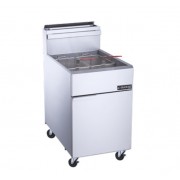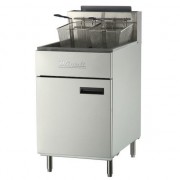
A well-oiled food service establishment will almost always have at least one commercial deep fryer. Diners may use a restaurant fryer for French fries, onion rings and wings. Bakeries may create unique and delicious donuts and concession stands use fryers for everything from Twinkies to Oreos! Countertop fryers are great for appetizers and are available in electric or gas. A double-basket commercial deep fryer can maintain a steady output of fried delicacies for even the busiest of sports bars! Oil will be a significant expense, so keep your fryer oil clean with industrial fryer oil filters and sediment trays.
How to choose commercial fryer properly?
- Drainboards. Drainboards serve as a place to put baskets/trays of freshly fried product. Installed on a slight angle, these allow oil to drain back into the tank, while simultaneously frying more products.
- Flue. Located only on gas fryers, the flue is the area in the back of the fryer where the gasses travel out of the unit and toward the hood.
- Flue deflector / heat deflector. In addition to the flue, the flue deflector/heat deflector is only on gas fryers. This feature directs the gas more precisely to the exhaust hood, allowing the hood to work more efficiently.
- Frying area. Frying area is considered the amount of space that the operator has available to fry product. Measured in length x width.
- Fryer Battery. A fryer battery allows an operator to easily order a set of fryers that they can bank together, instead of ordering multiple units separately.
- Output. In addition to a tank's capacity, many manufacturers will list a unit's output in pounds, referencing the number of French fries the unit can produce per hour. This helps operators determine if the unit is right for their volume of business, unable to keep up, or if they could save some money by going with a model with lesser output.
- Recovery Time. Recovery time is the length of time it takes the fat to return to the desired cooking temperature after food is submerged in it. If the temperature drops too much or does not return quickly to the proper cooking temperature, the food may absorb excess fat and become greasy.
- Sediment Zone. A major difference between fryer types is the "sediment zone". This is where cracklings, small pieces of food, and breading will collect as they fall off during cooking. Some manufacturers may call this area a "cold zone" because the oil in this area is not as hot as the cooking zone.
- Tank Capacity. Commercial fryers are often referred to by their tank capacity. For example, a "40 Pound Fryer" will hold up to 40 pounds of fryer oil. Some manufacturers will also rate their units based on the number of pounds of French fries the unit can produce per hour. Generally, a quality fryer can produce a volume equal to 1 1/2 to 2 times the weight of oil it can hold. Thus, a 40-pound fryer could produce up to 80 pounds of French fries per hour, under ideal conditions.
- Temperature control/temperature range. Proper temperature control is important because if the temperature is too high, oil can burn and ruin the food's taste, also limiting the life of the oil. If the temperature is too low, the product won't be as crisp and will absorb more oil.
- “Topping off” Oil Reserve. With a “topping off” oil reserve the oil automatically maintains an optimal level. This limits the need for employees to carry heavy oil containers through a busy kitchen and thus improves the safety of your establishment.
How to use commercial fryer properly?
Here are some tips:
Add Food to a Fryer the Right Way
Always slack frozen food in a refrigerator before adding it to the commercial fryer. Slacking, per the FDA, is the, "... process of moderating the temperature of a food, such as allowing food to gradually increase from a temperature of -10 degrees F to -4 degrees F in preparation for deep-fat frying ... ."
Allowing that slight change can make a big difference because it results in a reduction of ice crystals on the food. Water is an enemy of oil. It can promote the break down of the oil and those little bits of ice falling into the hot oil can cause pops and splatters that make a mess and can burn your workers.
Additionally, even a few degrees of temperature change helps reduce the heat required to cook the food. Dumping frozen-solid foods into the oil will result in longer cook times as the oil temperature is quickly dropped. As the fryer struggles to keep up, your staff may become frustrated and adjust the thermostat upward. That not only increases your utility demands, it will also further degrade your oil, lead to a shorter usable life for your fryer, and can lead to food that is burnt on the outside but still cold on the inside.
Avoid Dumping Crumbs and Salt into the Oil
When food, particularly breaded items and those that come frozen in bulk, are emptied into the fryer baskets, it can drop a lot of crumbs. If you're doing that work right over the frypot, all those crumbs will fall into the oil, where they will cook until they carbonize, then ruin the flavor of your foods, pepper fried items with little black specks, and – again – degrade your oil.
To avoid all that, load your deep fryer baskets away from the vats and over a container that can capture those crumbs. Additionally, avoid salting your foods over the frypot, as salt is another enemy of oil.
Fryer Oil Filtration is Critical
The absolute best way to protect the quality of your food, and to extend the life of both your oil and your fryer, is to regularly filter your oil. It's a fairly simple step, particularly if you opt for a fryer with a built-in filtration system. Practiced regularly – which means once every day for most establishments, more if the unit is used heavily – it can make a world of difference in the quality of your foods and can save you significantly in oil costs.
Where to buy commercial fryer?
You can search on the Internet and find the nearest store around you or shop online.
Why choose WebKitchenStore to buy commercial fryer?
As a professional manufacturer of commercial kitchen equipment, WebKitchenStore keeps improving the quality of products and services in accordance with the concept to safeguard the security and healthiness of catering service to better satisfy the customer’s needs and demands.
Commercial Fryers Related Brands
Premium Commercial Deep Fryer with 2 Fryer Baskets - EQCHEN 40 lb. Stainless Steel Natural Gas Floor..
Premium Commercial Deep Fryer with 2 Fryer Baskets - EQCHEN 50 lb. Stainless Steel Liquid Propane Fl..
Premium Commercial Deep Fryer with 2 Fryer Baskets - EQCHEN 50 lbs Stainless Steel Natural Gas Floor..
Premium Commercial Deep Fryer with 2 Fryer Baskets - EQCHEN 75 lb. Stainless Steel Liquid Propane Fl..
Premium Commercial Deep Fryer with 2 Fryer Baskets - EQCHEN 75 lb. Stainless Steel Natural Gas Floor..
$996.00
$1,276.00
$1,276.00
$1,496.00
$1,496.00












